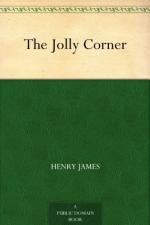He looked again at his watch, saw what had become of his time-values (he had taken hours for minutes—not, as in other tense situations, minutes for hours) and the strange air of the streets was but the weak, the sullen flush of a dawn in which everything was still locked up. His choked appeal from his own open window had been the sole note of life, and he could but break off at last as for a worse despair. Yet while so deeply demoralised he was capable again of an impulse denoting—at least by his present measure—extraordinary resolution; of retracing his steps to the spot where he had turned cold with the extinction of his last pulse of doubt as to there being in the place another presence than his own. This required an effort strong enough to sicken him; but he had his reason, which over-mastered for the moment everything else. There was the whole of the rest of the house to traverse, and how should he screw himself to that if the door he had seen closed were at present open? He could hold to the idea that the closing had practically been for him an act of mercy, a chance offered him to descend, depart, get off the ground and never again profane it. This conception held together, it worked; but what it meant for him depended now clearly on the amount of forbearance his recent action, or rather his recent inaction, had engendered. The image of the “presence” whatever it was, waiting there for him to go—this image had not yet been so concrete for his nerves as when he stopped short of the point at which certainty would have come to him. For, with all his resolution, or more exactly with all his dread, he did stop short—he hung back from really seeing. The risk was too great and his fear too definite: it took at this moment an awful specific form.
He knew—yes, as he had never known anything—that, should he see the door open, it would all too abjectly be the end of him. It would mean that the agent of his shame—for his shame was the deep abjection—was once more at large and in general possession; and what glared him thus in the face was the act that this would determine for him. It would send him straight about to the window he had left open, and by that window, be long ladder and dangling rope as absent as they would, he saw himself uncontrollably insanely fatally take his way to the street. The hideous chance of this he at least could avert; but he could only avert it by recoiling in time from assurance. He had the whole house to deal with, this fact was still




